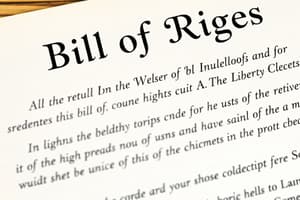Podcast
Questions and Answers
किस अधिकार का मुख्य उद्देश्य यह है कि व्यक्तियों को अपने आप को दोषी साबित करने के लिए मजबूर नहीं किया जा सके?
किस अधिकार का मुख्य उद्देश्य यह है कि व्यक्तियों को अपने आप को दोषी साबित करने के लिए मजबूर नहीं किया जा सके?
- यथार्थी को प्रतिनिधित्व प्राप्त करने का अधिकार (correct)
- स्वामित्व पर हमले का संरक्षण
- अत्यधिक जमानत और क्रूर और असाधारण दंड के खिलाफ संरक्षण
- सैनिकों के प्रतिवास के खिलाफ संरक्षण
कौन-सा संकेत करता है कि बिल ऑफ राइट्स को संविधान में 1791 में शामिल किया गया?
कौन-सा संकेत करता है कि बिल ऑफ राइट्स को संविधान में 1791 में शामिल किया गया?
- 13वां संशोधन
- 15वां संशोधन
- 14वां संशोधन
- 19वां संशोधन (correct)
कौन-सा ऐतिहासिक संदर्भ प्रस्तुत पाठ में उल्लेखित है?
कौन-सा ऐतिहासिक संदर्भ प्रस्तुत पाठ में उल्लेखित है?
- प्रक्रिया के हक का हक
- स्वामित्व पर हमले का संरक्षण
- सैनिकों के प्रतिवास के खिलाफ संरक्षण (correct)
- बैल के खिलाफ संरक्षण
मुक्ति की मुहीम पर कौन-सा मुख्य बहस है?
मुक्ति की मुहीम पर कौन-सा मुख्य बहस है?
'संरक्षण प्रक्रिया' का मतलब है?
'संरक्षण प्रक्रिया' का मतलब है?
बिल ऑफ़ राइट्स क्या है?
बिल ऑफ़ राइट्स क्या है?
किस अधिकार में अमेरिकी नागरिकों को अपने सुरक्षा के लिए हथियार रखने का अधिकार है?
किस अधिकार में अमेरिकी नागरिकों को अपने सुरक्षा के लिए हथियार रखने का अधिकार है?
किस अधिकार में नागरिकों को अपने मत को प्रदर्शित करने का हक है?
किस अधिकार में नागरिकों को अपने मत को प्रदर्शित करने का हक है?
कौन-सा अधिकार एक मिली-भगत्तीपूर्ण, प्रकर्ष, औरपीरोंके पीरोंके मुकादमेकीसुरक्षा के लिए, एक पेशेवर, और पक्षप्रति-समीपसे-न्याय में सुरक्षित करता है?
कौन-सा अधिकार एक मिली-भगत्तीपूर्ण, प्रकर्ष, औरपीरोंके पीरोंके मुकादमेकीसुरक्षा के लिए, एक पेशेवर, और पक्षप्रति-समीपसे-न्याय में सुरक्षित करता है?
कौन-सा सहमति प्रेस सहमतिलेनेका सहमति?
कौन-सा सहमति प्रेस सहमतिलेनेका सहमति?
Study Notes
The Bill of Rights and the U.S. Constitution: A Foundational Understanding
The Bill of Rights—the first ten amendments to the United States Constitution—has become a cornerstone of American freedom and civil liberties. Initially proposed to appease the concerns of anti-federalists and strengthen the ratification of the Constitution, the Bill of Rights has not only stood the test of time but also served as a beacon of hope for millions seeking justice and protection from tyranny.
Ensuring Liberty and Justice
The Bill of Rights outlines inalienable rights that individuals are entitled to, regardless of their position, race, or creed. It safeguards the fundamental rights of American citizens, providing a basis for due process and the rule of law.
The amendments include some of the most cherished and recognized rights, such as:
- Freedom of speech: Protecting the right to express ideas and opinions freely.
- Right to bear arms: Ensuring that citizens may lawfully possess firearms for their protection.
- Freedom of religion: Guaranteeing the right to practice one's faith without government interference.
- Freedom of the press: Enabling a free and open exchange of information through media.
- Right to assembly: Safeguarding the right to gather and petition for redress of grievances.
- Right to a fair trial: Preserving the right to a speedy and impartial trial by a jury of one's peers.
- Protection against self-incrimination: Ensuring that individuals cannot be compelled to incriminate themselves.
- Protection against excessive bail and cruel and unusual punishment: Juxtaposing the severity of punishment with the crime committed.
- Right to due process: Ensuring that individuals cannot be denied their rights to fair proceedings.
- Protection against the quartering of soldiers: Safeguarding the rights of citizens against the forced housing of soldiers within their homes.
Historical Context
The Bill of Rights was not initially part of the Constitution when it was first proposed in 1787. Anti-federalists such as George Mason, George Clinton, and George Nicholas voiced concerns about the lack of protections for individual rights within the document. In response, James Madison, a champion for the Bill of Rights, drafted a series of amendments to address these concerns.
The Bill of Rights became part of the Constitution after a broad ratification in 1791. However, throughout history, it has not been immune to debate and discussion. Amendments have been proposed and ratified to incorporate evolving interpretations of rights, such as the 13th, 14th, 15th, 19th, and 26th Amendments.
Modern Implications
The Bill of Rights has had a profound and lasting impact on American society, serving as a template for other constitutions and international human rights agreements. It has also been a source of enrichment for legal discourse, serving as a touchstone for legal, philosophical, and political debates.
For example, free speech issues have been a significant topic of debate, with the Supreme Court ruling on cases relating to hate speech, flag desecration, and the rights of journalists and political dissidents. Similarly, the Second Amendment has been a subject of intense debate, with Supreme Court rulings establishing the right to bear arms for self-defense and hunting purposes.
As the world continues to evolve and evoke change, so too will the interpretation of the Bill of Rights. Yet, its foundational principles remain a beacon of hope for those seeking freedom and justice in a complex and ever-changing world.
Studying That Suits You
Use AI to generate personalized quizzes and flashcards to suit your learning preferences.
Description
Explore the significance and impact of the Bill of Rights, the first ten amendments to the United States Constitution, in safeguarding individual liberties and civil rights. Learn about the historical context, fundamental rights outlined, and the modern implications of these foundational principles.




